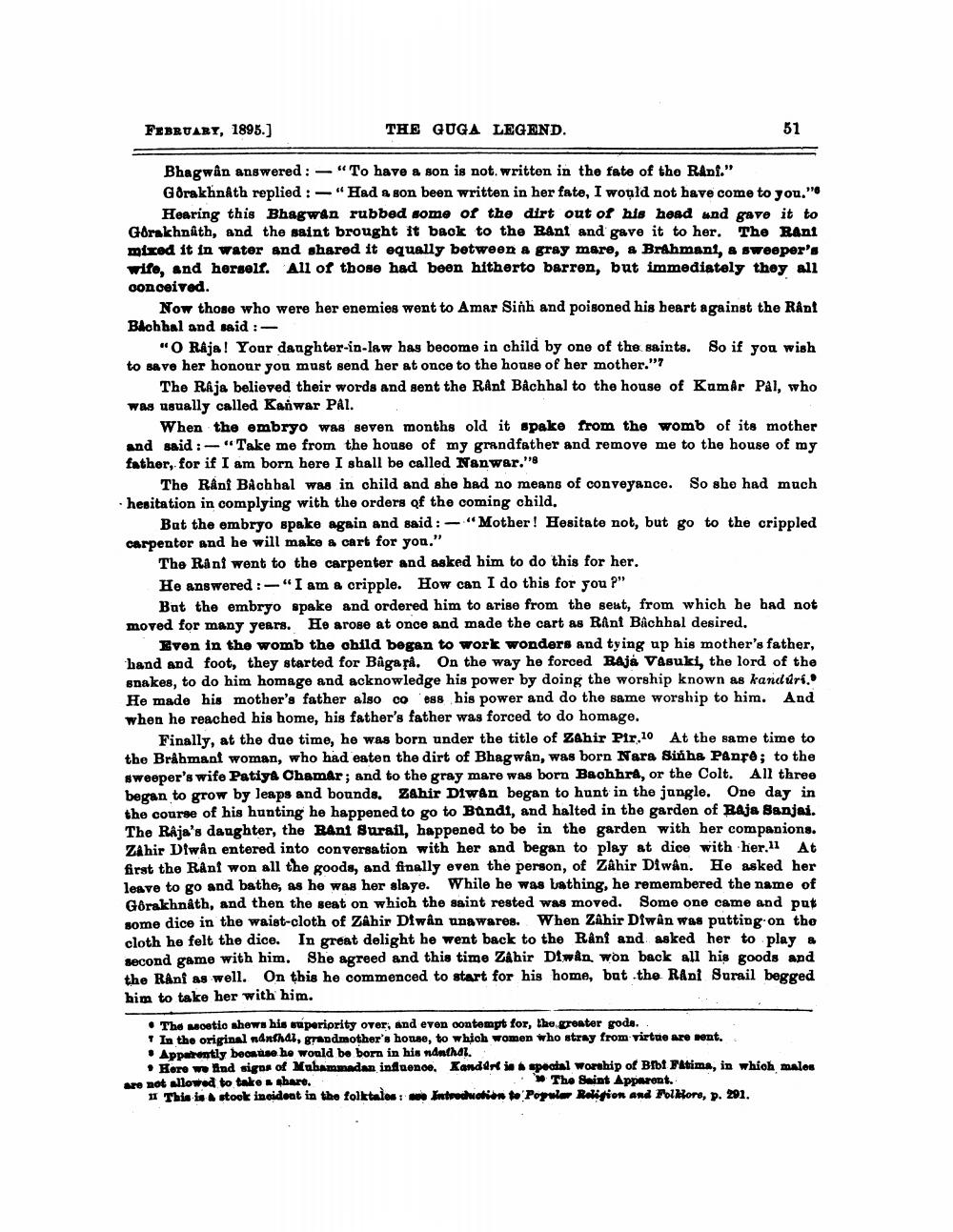________________
FEBRUARI, 1895.)
THE GUGA LEGEND.
51
Bhagwan answered: "To have a son is not written in the fate of the Rani." Gorakhnáth replied: "Had a son been written in her fato, I would not have come to you."
Hearing this Bhagwan rubbed some of the dirt out of his head and gave it to Gorakhnüth, and the saint brought it back to the Bant and gave it to her. The Rant mixed it in water and shared it equally between a gray mare, a Brahmani, & sweeper's wife, and herself. All of those had been hitherto barren, but immediately they all conceived.
Now those who were her enemies went to Amar Sinh and poisoned his heart against the Rånt Bachhal and said :
"O RAja! Your daughter-in-law has become in child by one of the saints. So if you wish to save her honour you must send her at once to the house of her mother."
The Raja believed their words and sent the Rønt Bâchhal to the house of Kumar Pal, who was usually called Kanwar PAI.
When the embryo was seven months old it spake from the womb of its mother and said: "Take me from the house of my grandfather and remove me to the house of my father, for if I am born here I shall be called Nanwar."
The Râni Bachbal was in child and she had no means of conveyance. So she had much hesitation in complying with the orders of the coming child,
Bat the embryo spake again and said: -"Mother! Hesitate not, but go to the crippled carpentor and he will make a cart for you."
The Rani went to the carpenter and asked him to do this for her. He answered : -"I am a cripple. How can I do this for you P"
Bat the embryo spake and ordered him to arise from the sent, from which he had not moved for many years. He arose at once and made the cart as Rant Bachhal desired.
Even in the womb the obild began to work wonders and tying up his mother's father, hand and foot, they started for Bagaså. On the way he forced Rajá Vasuki, the lord of the snakes, to do him homage and acknowledge his power by doing the worship known as kandúrí.. He made his mother's father also co88 his power and do the same worship to him. And when he reached his home, his father's father was forced to do homage.
Finally, at the due time, he was born under the title of Zahir Pir,20 At the same time to the Brâhmant woman, who had eaten the dirt of Bhagwân, was born Nara Sinha Pange; to the sweeper's wife Patiya Chamar; and to the gray mare was born Bachhrd, or the Colt. All three began to grow by leaps and bounds. Zahir Diwan began to hunt in the jungle. One day in the course of his hunting he happened to go to Bandi, and halted in the garden of Baja Sanjai. The Raja's daughter, the Rani Surail, happened to be in the garden with her companions. ZAhir Diwan entered into conversation with her and began to play at dice with her.11 At first the Rani won all the goods, and finally even the person, of Zahir Diwan. He asked her leave to go and bathe, as he was her slaye. While he was bathing, he remembered the name of Gorakhnath, and then the seat on which the saint rested was moved. Some one came and put some dice in the waist-cloth of Zahir Diwan unawares. When Zahir Diwan was putting on the cloth he felt the dice. In great delight he went back to the Rani and asked her to play a second game with him. She agreed and this time Zahir Diwan, won back all his goods and the Rani as well. On this he commenced to start for his home, but the Rani Surail begged him to take her with him.
• The woetio shows his superiority over, and even contempt for, the greater gode. * In the original santhal, grandmother's house, to which women who stray from virtue are rent. • Apparently boonuse he would be born in his ndnthal.
• Here wind sigos of Muhammadan influence. Kander is special Worship of Bibi Fatime, in which males are not allowed to take share.
The Saint Apparent. 11 This is a stook incident in the folktales: Introduction to Popular Religion and Folklore, p. 291.




